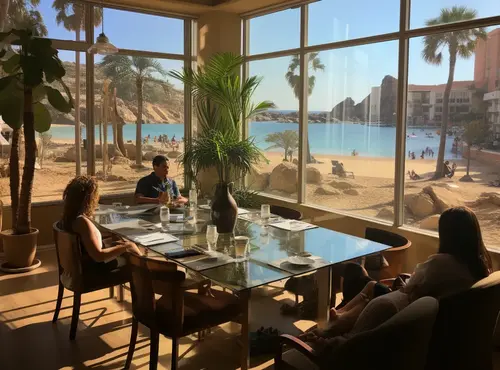VR Designer Foundation Course: Master Virtual Reality Design, UX, and 3D
Course Overview:
The VR Designer Foundation Course: Master Virtual Reality Design, UX, and 3D is a hands-on, beginner-friendly training built for the future of immersive design. This VR design course introduces participants to essential tools, platforms, and techniques used in the virtual reality industry. Blending theory with practical application, it explores 3D interaction, VR user experience design, and spatial interfaces while leveraging industry-standard platforms like Unity and Blender. Participants will learn how to design intuitive VR environments, develop interactive prototypes, and understand the principles that distinguish successful VR experiences.
This training is ideal for those seeking virtual reality design training grounded in real-world tools and use cases. By the end of this beginner VR development course, learners will be equipped with the knowledge and confidence to contribute to XR projects and apply best practices for immersive, human-centered design. Whether you want to learn VR design for games, education, or enterprise, this introduction to virtual reality design ensures you start with a rock-solid foundation.
Target Audience:
- Junior designers and developers
- UI/UX professionals
- 3D modelers and digital artists
- Product and game designers
- Multimedia and e-learning specialists
Targeted Organizational Departments:
- Innovation and R&D teams
- UX/UI and human factors departments
- Learning & development teams
- Creative and design studios
- IT and software development departments
Targeted Industries:
- Gaming and entertainment
- Architecture, Engineering, and Construction (AEC)
- Automotive and manufacturing
- Healthcare and simulation-based training
- Education technology and e-learning
- Marketing and advertising agencies
Course Offerings:
By the end of this course, participants will be able to:
- Explain the core principles behind immersive design and virtual environments
- Navigate Unity and apply it in a beginner VR development course context
- Create basic VR prototypes with spatial UI and interactive components
- Apply best practices in VR user experience design for various headsets
- Build 3D interactions using Unity XR tools and design frameworks
- Understand real-world applications of tools from the VR interaction design course modules
- Present a working VR scene as part of a capstone project
Training Methodology:
This course applies experiential and project-based learning methodologies that mirror real-world virtual reality design training workflows. Each session combines guided instruction with live demonstrations, interactive exercises, and feedback from experienced facilitators. Participants will explore Unity and Blender through hands-on labs and collaborative peer activities designed to reinforce practical skills.
Learners will benefit from a mix of gamified learning, visual walkthroughs, and peer-to-peer discussions, all contributing to foundational VR design course mastery. Reflection periods ensure integration of key concepts, while scaffolded exercises gradually increase in complexity to suit a beginner VR development course audience.
Course Toolbox:
- Course workbook (digital PDF)
- Unity 3D engine access and tutorials (intro to VR development)
- Sample VR interaction templates from OpenXR and Oculus Quest
- VR-ready 3D assets and prefabs
- Blender project samples (modeling for VR)
- Online resources and reading materials
- Interactive quizzes and self-check assessments
- Links to Unity Learn and Roll-a-ball tutorial series
Note: Tools are not provided, but insights and examples of tools are included.
Course Agenda:
Day 1: Foundations of Virtual Reality Design
- Topic 1: Introduction to Virtual Reality Design Principles
- Topic 2: Types of VR Interfaces and Interaction Models
- Topic 3: Introduction to Unity Interface and Scene Creation
- Topic 4: Overview of XR Devices and Setup
- Topic 5: Principles of Immersion, Presence, and Perception
- Topic 6: Understanding 3DoF vs 6DoF Tracking Systems
- Reflection & Review: Summary discussion of key concepts and practical takeaways
Day 2: Designing Interactive VR Environments
- Topic 1: Navigating Unity XR Plugins and SDKs
- Topic 2: Spatial Design and Scene Hierarchies
- Topic 3: Diegetic and Non-Diegetic UI in VR
- Topic 4: Lighting, Materials, and Optimization for VR
- Topic 5: Human-Centered Design in Virtual Reality
- Topic 6: Interaction Feedback and User Comfort Considerations
- Reflection & Review: Interactive feedback session with group prototyping review
Day 3: VR Interaction and Prototype Building
- Topic 1: Object Manipulation and 3D Input Systems
- Topic 2: Physics and Movement in VR Environments
- Topic 3: Designing with Controllers and Gestures
- Topic 4: Creating UI Panels and Gaze-Based Interfaces
- Topic 5: Importing Assets and Animations from Blender
- Topic 6: Animating VR Events with C# in Unity
- Reflection & Review: Participant presentations of mini-VR projects
Day 4: Advanced Development and Experience Testing
- Topic 1: Designing for Comfort and Accessibility in VR
- Topic 2: Implementing Teleportation and Navigation Mechanics
- Topic 3: Audio Integration and Feedback Loops in Unity
- Topic 4: Testing on Meta Quest & Mobile VR Platforms
- Topic 5: Performance Optimization and Build Settings
- Topic 6: Testing and Debugging Immersive Scenarios
- Reflection & Review: Design critique and beta-testing walkthrough
Day 5: Final Projects and Capstone Demonstration
- Topic 1: Finalizing a Fully Functional VR Scene
- Topic 2: Peer Reviews and Expert Feedback
- Topic 3: Preparing a VR Portfolio and Demo Reel
- Topic 4: Career Pathways in Immersive Design
- Topic 5: Certification and Continuing Learning Resources
- Topic 6: Recap of VR Design Course and Industry Future Trends
- Reflection & Review: Capstone presentation, final reflection, and course wrap-up
FAQ:
What specific qualifications or prerequisites are needed for participants before enrolling in the course?
No prior experience in VR is required. Familiarity with basic computer usage, 3D tools, or design software is helpful but not mandatory. This is an entry-level VR designer foundation course.
How long is each day's session, and is there a total number of hours required for the entire course?
Each day's session is generally structured to last around 4-5 hours, with breaks and interactive activities included. The total course duration spans five days, approximately 20-25 hours of instruction.
What’s the difference between spatial and diegetic UI in VR design?
Spatial UI is placed in the environment as a 2D or 3D panel and interacts like a HUD. Diegetic UI is part of the VR world itself (e.g., a wristwatch showing time).
How This Course is Different from Other VR Designer Foundation Courses:
What sets the VR Designer Foundation Course: Master Virtual Reality Design, UX, and 3D apart is its balanced mix of technical rigor, hands-on development, and user-centered design. Unlike most basic VR design courses that limit learning to software functions, this course integrates immersive design theory, technical exercises, and real-world case applications.
Participants gain not only practical experience with Unity, Blender, and XR SDKs but also develop the critical thinking needed to evaluate and create compelling virtual environments. The program emphasizes human interaction, ethical design, and feedback-driven iteration—skills not commonly taught in beginner VR development courses.
With direct exposure to modern VR user experience design principles and VR interaction design course content, this course ensures you leave with a portfolio-ready VR scene, and the confidence to take on real-world XR projects.
ساعات معتمدة: 5 ساعة في اليوم
وضع الدورة: دوام كامل
مقدم الدورة: مركز (Agile Leaders) للتدريب
-
مواعيد هذه الدورة!!
-
Madrid 2025-10-27
-
Doha 2025-11-23
-
Rome 2025-11-24
-
Johannesburg 2025-11-30
-
Baku 2025-12-22
-
Langkawi 2025-12-29
-
Dubai 2025-12-30
-
Tokyo 2026-01-27
-
Phuket 2026-02-23
-
Kuala Lumpur 2026-02-24
-
London 2026-03-24
-
Montreux 2026-03-30
-
Amsterdam 2026-04-21
-
Milan 2026-04-28
-
Barcelona 2026-05-26
-
Sharm El-Sheikh 2026-06-23
-
Milan 2026-06-23
-
Istanbul 2026-06-30
-
Tbilisi 2026-07-21
-
Munich 2026-07-21
-
Manama 2026-07-27
-
Muscat 2026-08-24
-
Dubai 2026-08-25
-
Nairobi 2026-08-31
-
Kuwait 2026-09-21
-
London 2026-09-22
-
Sharm El-Sheikh 2026-09-29
-
San Diego 2026-09-29





















